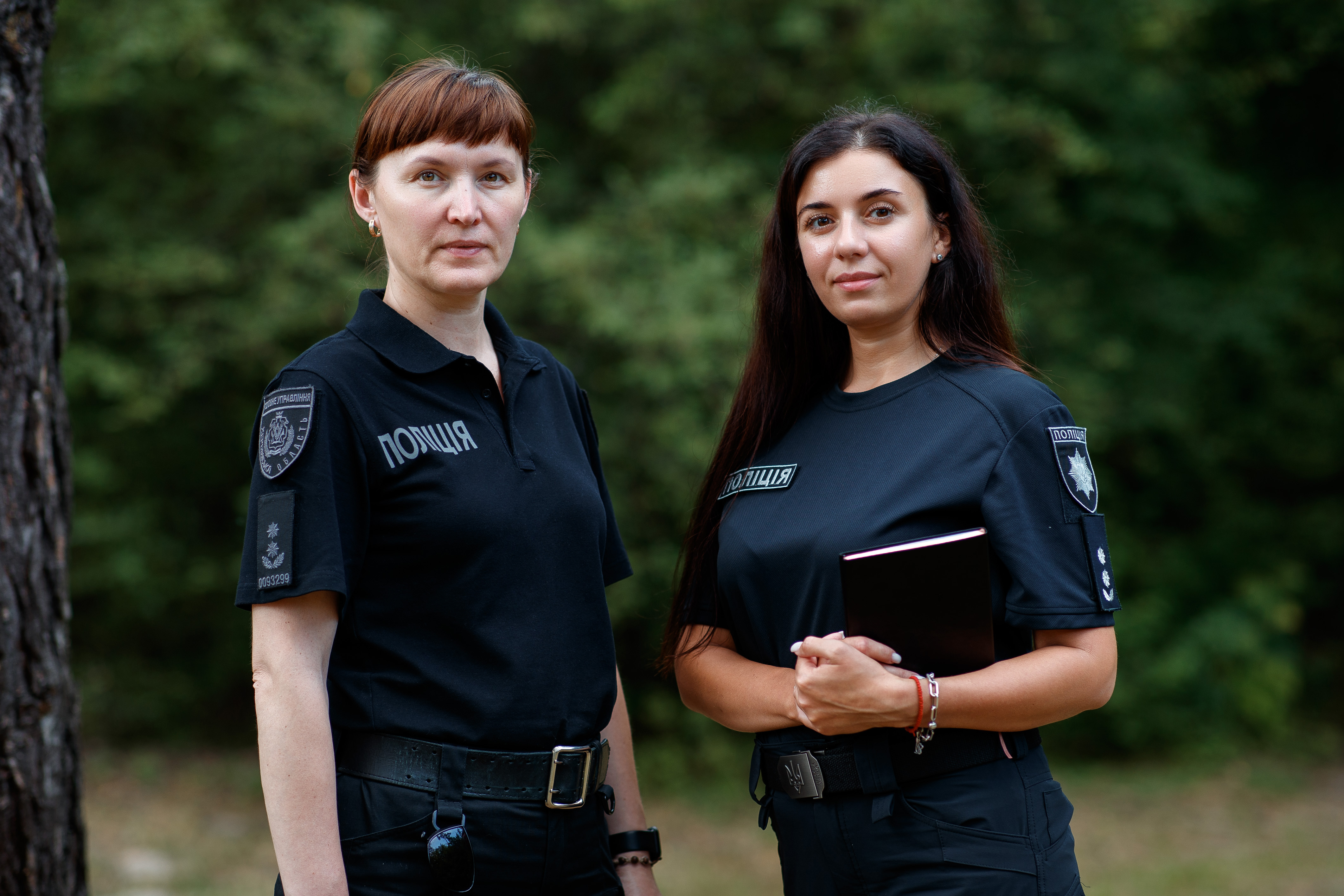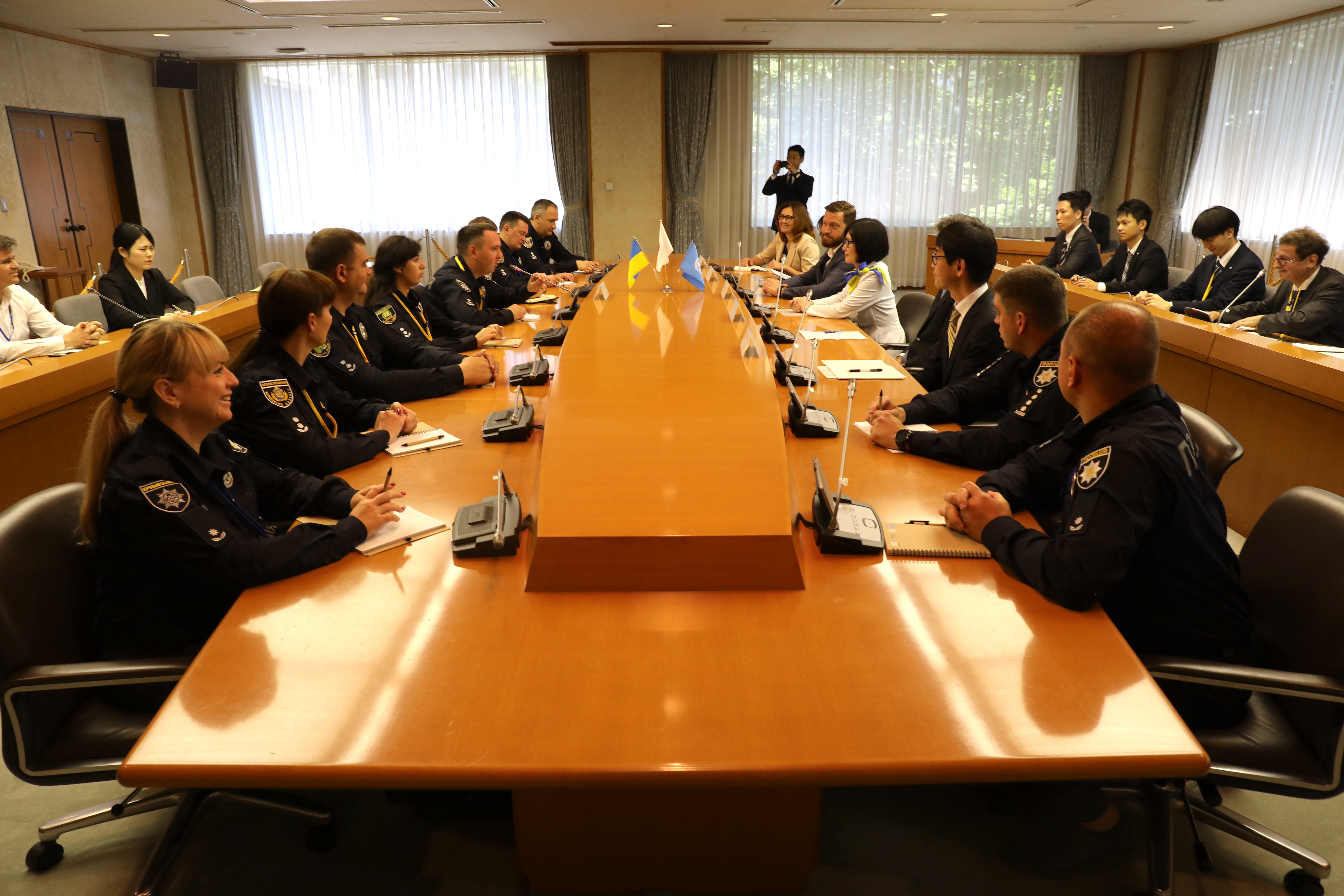Frontline forensics: Ukrainian women leading the charge in crime scene investigation
December 18, 2023

From left to right: Oksana Zaporozhchenko and Kateryna Onipenko before study tour to Japan.
Strengthening the Forensic Expertise of the Ukrainian National Police through International Collaboration
Russia’s invasion of Ukraine has caused immense suffering and horrendous human rights violations. The fundamental rights of the people are at risk, challenged by atrocious war crimes and massive abuses of international humanitarian law. The full-scale invasion of Ukraine has affected millions of civilians, resulting in massive destruction, the demolition of entire settlements and towns, damage to energy and social infrastructure, displacement, loss of life, and conflict-related sexual violence.
Under these circumstances, observance of human rights and the rule of law are being heavily affected and deteriorated. In the context of war in Ukraine, national justice institutions are facing mounting pressures and unprecedented challenges that require innovative solutions and approaches. United Nations Development Programme (UNDP) in Ukraine and the Government of Japan are providing comprehensive assistance to the National Police of Ukraine to bolster their capacity to address multidimensional challenges that have been caused by the war.
This support has a strong focus on enhancing the expertise and technical capacities of the forensic system to properly investigate war crimes and provide assistance to war-affected persons.
In July and October 2023, the Government of Japan hosted Ukrainian National Police forensic units on study tours, sharing advanced investigative methods and practices.

From left to right: Kateryna Onipenko and Oksana Zaporozhchenko showing mobile forensic laboratory of the National Police of Ukraine.
We have talked to Police Lieutenant Colonel Kateryna Onipenko, Head of the Department of Forensic Support of the Investigative Department of the Main Directorate of the National Police in Donetsk region and Police Lieutenant Colonel Oksana Zaporozhchenko, Head of the Department of Forensic Support of the Investigative Department of the Main Directorate of the National Police in Kherson region, who participated in the study tour to Japan to learn first-hand insights and thoughts on this initiative.

Kateryna Onipenko and Oksana Zaporozhchenko before study tour to Japan in July 2023.
Challenges and uniqueness of forensic investigations
"I joined the police service 17 years ago," recalls Kateryna. "Even before completing school, I knew that I wanted to study and work in the field of law and jurisprudence. However, I wasn't sure which specialization to choose. Therefore, I opted for the course in general law and studied at the university that prepared police officers. During my studies, I had internships at a notary office and a lawyer's office. Eventually, I decided to take a three-month internship with the police, after which I realized that I wanted to work there. Since then, I have been working with the National Police. I served as an investigator, and seven years ago, when the Department of Forensic Support of the Investigative Department was established, I was offered the position of department head. By that time, I had studied forensic investigation and applied what I learned in my work."
For all these years, Kateryna worked in Donetsk Oblast, and in 2014, she was in Mariupol when the armed conflict in the east of Ukraine began.
"Was I scared? Of course, for maybe half an hour. But then I pulled myself together. I had professional and life experience that helped me to stay strong and continue my service. But, of course, it was scary. In 2014 and 2015... Throughout those years, I felt fear, not for myself, but for the people we serve and because of the responsibility I had: to serve with dignity and work at the highest level, for those who were watching us in hope of help. I was on duty during the horrifying events in Mariupol, my native city, in 2015, and I vividly remember that day. Thirty-five civilians were killed, and that was the first time I saw so many bodies that we had to identify. It was Sunday, 10 a.m., when the attack happened. How can you explain this horrifying event to a 15-year-old girl or to parents who were looking for their loved ones? We had to do our job and also provide comfort to those people in despair."
Oksana has been working with the police since 1999 and has held various positions as an investigator. In 2017, she joined the forensic department as a forensic investigator, and by 2020 she had assumed the position of department head. "Our main tasks involve assisting investigators in documenting crimes. We meticulously review the scene, identify, document and eliminate these traces and objects which related to the committed crime and the person who committed it," she explains.
Kateryna further adds that in her opinion the profession of forensic investigator is one of the most interesting within the entire police system, because every case is unique and there are no identical situations. “Each new case presents a fresh challenge that requires new approaches, new knowledge, and undivided attention. The challenge lies in the critical importance of the examination scene, as it cannot be replicated. Once you leave the scene, it's impossible to recreate it or return to the initial conditions, making it essential to extract the forensic information you need during the examination,” she says.
Kateryna and Oksana shared that the work demands intense concentration, attentiveness, and perfect coordination. In situations where forensic groups operate in the frontline, time is limited for security reasons. Otherwise, work will continue as long as necessary. “Once we spent nearly 48 hours examining a scene, with multiple forensic groups rotating each other. Each case is different. Sometimes one forensic investigator can be tasked with examining the scene. For more complex cases, a forensic group with mobile laboratories is despatched,” says Kateryna.
“When working in a team, responsibilities are distributed and work is coordinated. The distribution of responsibilities varies each time. This work is anything but routine,” she added.
Life and service after 24 February 2022
At the beginning of the full-scale war Oksana was in Kherson region, in the area which was temporary occupied for several days so she had to leave her family and move to Mykolaiv city to continue her service. “Before the war, the road from Kherson to Mykolaiv typically took a maximum of 40 minutes travelling directly. However, during the hostilities it became impossible to take the straight road. Instead, we had to navigate through fields. Now the trip from Kherson to Mykolaiv took almost 6 hours in a cargo-passenger bus, where the wind seeped through gaps,” says Oksana. “Throughout all the periods of de-occupation in Kherson region, my team and I have consistently been engaged in investigations and documentations.”
With the onset of the full-scale war, Kateryna continued to serve in Donetsk region. "My team and I often go to the frontline for investigations. Typically, we don't have much time for our work, perhaps two hours or less. There are instances when we are unable to investigate the crime scene due to continuous shelling. Another new challenge arose when we had to conduct investigations in the newly de-occupied territories in Donetsk region. There, we discovered mass and individual graves, requiring us to exhume and identify around 300 bodies. We had never dealt with anything like this before.”

Ukrainian forensic investigators meet Matsuda Kuninori, Ambassador Extraordinary and plenipotentiary of Japan to Ukraine, Maksym Tsutskiridze, Deputy Head of the National Police of Ukraine – chief of the Chief Investigative Department, and Olena Ursu, UNDP Ukraine Democratic Governance Team Leader before study tour to Japan in July 2023.
Oksana and her team were also involved in documenting war crimes in the de-occupied territories. "In July, we began working in the Kherson region, specifically in that small part of the de-occupied territory in Boryslav district. We documented war crimes, recorded locations where shells had hit, investigated places where people were killed, exhumed the deceased, examined torture chambers, and scrutinized locations where people were detained. The aim is to ensure high quality collection of evidence that those responsible are held accountable for the war crimes they committed."
Global Insights: Ukrainian Police on a knowledge exchange visit to Japan

The delegation of the forensic investigators of the National Police of Ukraine at the opening ceremony in Japan.
"We have already engaged in knowledge exchange with other countries, but those countries have never had a similar experience. Japan is a country that has experience with mass autopsies after catastrophic earthquakes and tsunamis in 2011. Thus, I was very interested in this study tour to learn from Japanese colleagues," says Kateryna. "For instance, I didn't know anything about Japanese forensic investigators, what their roles entail, and the methods they employ. Japan is a highly developed country. Even though we use innovative tools and methods, we still rely on traditional methods such as magnetic applicators and powders for trace detection, while in Japan, they use various scanners. I was curious about the techniques they employ in Japan to detect specific traces, particularly those of biological origin, and their processes for interpreting and obtaining results. Understanding the significance of each trace, their potential applications, and the associated research is essential."
Following the visit to Japan, Oksana shared that the study tour was of particular interest to her, as a lot of attention was paid to the catastrophic events in Fukushima. "At home, I had a bit of a similar situation – in the summer, before the visit, we had flooding caused by the Kakhovka dam destruction. They had flooding too, but they had it as a result of an earthquake, and we had it as a result of war. For example, the flooding significantly affected Kherson region. For me, it is a painful topic because my home is also on the left bank of Dnipro river, where there was a lot of flooding. People suffered, many died, and houses and infrastructure were destroyed," she explains.

Oksana Zaporozhchenko at the study tour to Japan.
"During the visit, we shared our experiences and work skills: what we do in Ukraine and what they did while the town and prefecture of Fukushima were rebuilding after the great flood, as they call it.”
“In Japan people often asked us how we manage to work and live in such conditions. They are shocked and amazed at how strong and resilient Ukrainian people are. Despite the difficult conditions Ukraine currently finds itself in, we are continuing to work, study, improve our knowledge, and maintain our sense of humour. We are a resilient, strong nation, especially in regions that have suffered greatly as a result of war and flooding.”
This media material is developed within the project "Promotion of Human Security in Ukraine Through Responding to the Multidimensional Crisis Caused by the War," implemented by the UNDP and financed by the Government of Japan. The article content do not necessarily reflect those of the Government of Japan or UNDP.

 Locations
Locations


